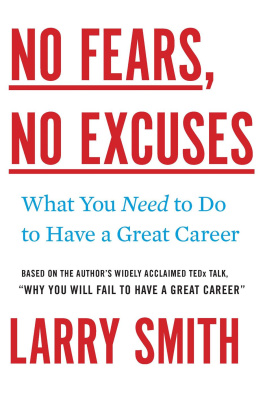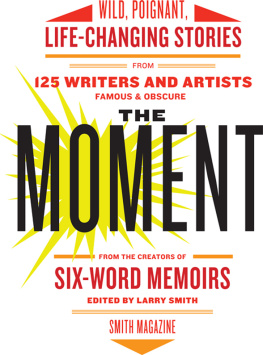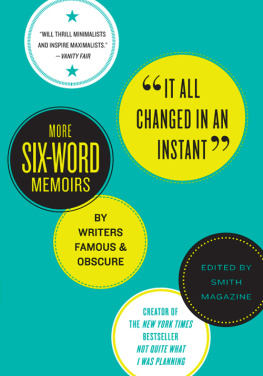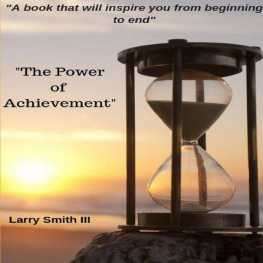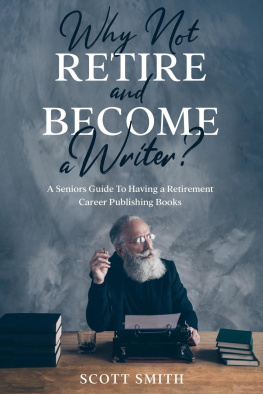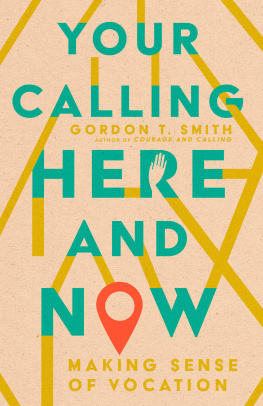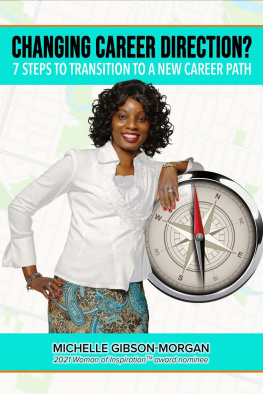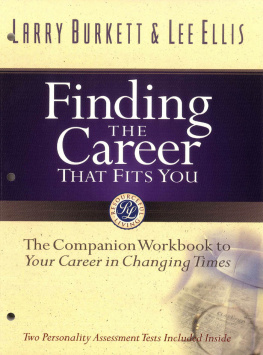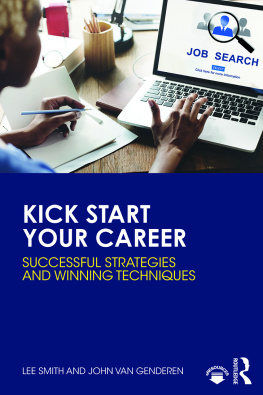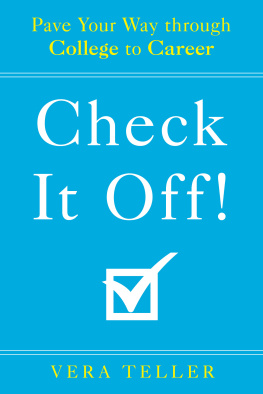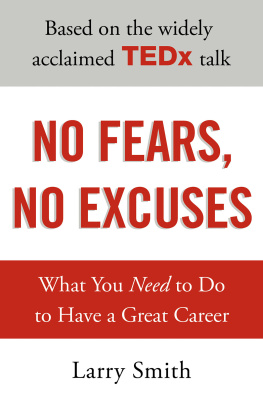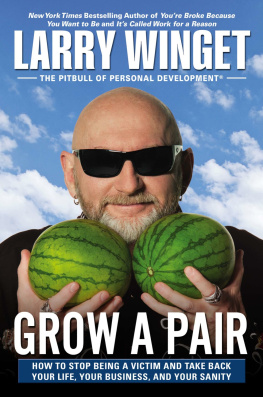Copyright 2016 by Larry Smith
All rights reserved
For information about permission to reproduce selections from this book, write to or to Permissions, Houghton Mifflin Harcourt Publishing Company, 3 Park Avenue, 19th Floor, New York, New York 10016.
www.hmhco.com
Library of Congress Cataloging-in-Publication Data
Title: No fears, no excuses : what you need to do to have a great career / Larry Smith.
Description: Boston : Houghton Mifflin Harcourt, 2016.
Identifiers: LCCN 2015037676 | ISBN 9780544663336 (hardback) | ISBN 9780544663282 (ebook)
Subjects: LCSH: Career development. | Vocational guidance. | BISAC: BUSINESS & ECONOMICS / Careers / General. | BUSINESS & ECONOMICS / Motivational.
Classification: LCC HF 5381 . S 627 2016 | DDC 650.1dc23
LC record available at http://lccn.loc.gov/2015037676
Cover design by Brian Moore
v1.0416
This book is dedicated to my students. They have taught me so much and inspired me so often.
Introduction
Passion is a word we use often when we talk about our love lives, but rarely when it comes to our work lives. When you feel passionate about your work, there is no great difference between the way you feel on Monday morning and the way you feel on Saturday morning. When you feel passionate about your work, your workplace is not a prison that is meant to encase you until youve earned your freedom, and your work is not a means to an end. When you feel passionate about your work, you do not set rigid boundaries between work time and personal time, because the work itself is personal. When you feel passionate about your work, your talent has room to stretch and to grow.
I believe that such passion in work is available to everyone, without exception. It may not be a simple matter to identify it and achieve it, but it is available nonetheless. And by the time youve finished this book, you will see how. Why am I so confident? Simply because I have watched many hundreds of people from many different backgrounds with many different goals achieve great success using a handful of straightforward techniques.
I work in the heart of a university, and I see such a great waste of talent all around me. I have been cursed to watch such waste for decades. Young men and women enter my life when they are just students, filled with energy and drive. They hope to undertake wondrous adventures. They have amazing ideas and penetrating insights, ideas I would never have had at their age. They can make a computer or a cello sing, they can intuit solutions to mathematical problems I cannot understand, they can spin a tale or design a cupboard no one has ever seen before. Theirs iswithout a doubtreal talent.
Yet, theirs is also raw talent. It is often naive, incomplete, unrefined, and so chaotically slapped together that its effect is weakened. Talent is sometimes found in a disheveled seventeen-year-old; other times its in the polished demeanor of a twenty-seven-year-old; sometimes its in those who will be the first in their families to be educated beyond high school; other times its in those whose families are better educated; sometimes its in someone newly arrived in the country. But the talent is there nevertheless, should you care to look.
I care to look. And I watch, waiting for these talented individuals to set their chosen worlds afire with their vision and commitment.
Unfortunately, they then grow up. The grown-up world is where talent goes to die.
The grownups I meet, whether former students or not, have all too often been captured by our worker-bee culture. The rules are clear: do what you are told and you get paid; work to live on the weekend and dread Monday; look forward to retirement and hope you do not end up dreading that as well; expect that pleasure or satisfaction in the work is an uncommon bonus.
This epidemic of lowered expectations has taken many victims, prompting the ever-common phrase: I had to get realistic. Consider how many people end their day at a bar or the dinner table, complaining about the boss or the work, and how many sit in frustrated silence.
My concern has increased over the years, and it has even led me to record a TEDx talk at the University of Waterloo, where Im an adjunct associate professor of economics and a career counselor. The talk was called, Why You Will Fail to Have a Great Career. There was no intent to craft a dismal message; I just tried to tell the truth as Ive experienced it, drawing on the more than 20,000 conversations I have had about career success. (Yes, I actually do count and log my conversations. Im an economistI love data.) The TEDx video repeated the common and routine excuses I have heard too many times. Perhaps, I thought, it would stir a few people into action.
But as it turned out, millions watched, and my concern deepened. The challenge of finding a great career was affecting more people than I had thought. Some watched the video because they felt they needed the tough love the title of the talk promised; others because they were sure the title was wrong and needed to figure out why. Either way, an amazing range of email messages arrived: grateful, heart-rending, angry, inquisitive, skeptical, desperate, and confused. They came from parents, teenagers, educators, senior citizens, university students, recent graduates, middle-aged professionals, PhDs, men and women. The emails came from Canada, the United States, Mexico, Britain, France, Denmark, Portugal, Russia, Croatia, Greece, Turkey, and India.
Some found inspiration in my words. Some found cause to object. Others invented more excuses. Many asked for more guidance. And I had to wonder whether I did indeed have more guidance to offer. Careeryour lifes workis too important to speculate about what might be true or useful. I decided to respond with this book for three reasons.
First, in spite of all the obstacles, I have seen plenty of people from diverse backgrounds create great careers for themselves, careers that give them profound satisfaction and create meaningful impact on the world around them. These people are a credit to their communities and role models to their families. They are happy. So I know it is possible.
Second, I happen to be one of these happy people with a great career. I found my passion early in life when, as a kid, I felt my teachers werent doing a good enough job. While other kids built forts in their backyards, I created my own miniature classroom, complete with imaginary students. So I knew Id be a teacher. But what would I teach? A history instructor in high school had a collection of books about finance and economics. I started reading them and never really stopped. But that doesnt mean everything fell into place. After I finished graduate school, I worked as an economist, ultimately finding a secure, stimulating job working for the Canadian government. There was room for growth, I enjoyed the people I worked with, and I had an opportunity to make real impact on public policy.
In short, it was a good job, but it wasnt a great career for me. I wanted to start my own consulting business, where Id have more freedom to pursue my many areas of interest, from physics to architecture. I knew what I wanted, and yet my letter of resignation still sat on my desk for a week before I turned it in. I am afraid to think what I would have missed if I hadnt gone through with it.
Thats not to say that everything has been simple from the day I decided to pursue a great career. My very first client as a consultant turned out to be a crook who fled the country one step ahead of the Royal Canadian Mounted Police. I was financially stressed, embarrassed, and my confidence took a hit. I didnt see that I had any choice but to keep my head down and keep working. I couldnt go back, so it was clear my only choice was to move forward. And I did.
Next page
